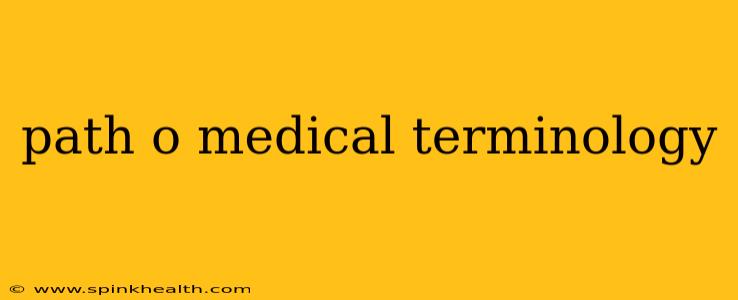The world of medicine is a vast and complex landscape, filled with intricate procedures, groundbreaking research, and a language all its own: medical terminology. For those seeking a career in healthcare, mastering this specialized vocabulary is not just beneficial—it's essential. But how does one navigate this intricate path? It's a journey, not a sprint, and understanding the key steps is crucial.
This isn't just about memorizing lists; it's about unraveling the fascinating etymology of medical words, discovering the logic behind their construction, and building a deep understanding that allows you to decipher even the most unfamiliar terms. Let's embark on this journey together.
What are the basic building blocks of medical terminology?
Medical terminology isn't random jargon; it's a carefully constructed system built upon prefixes, suffixes, and root words, largely derived from Greek and Latin. Think of these as linguistic Lego bricks, each with a specific meaning that contributes to the overall understanding of a complex medical term.
For instance, let's take the word "cardiomegaly." "Cardio" (heart), "mega" (large), and "-aly" (condition) combine to mean "enlarged heart." Understanding these individual components allows you to quickly grasp the meaning of the entire term, even if you've never encountered it before.
How can I effectively learn medical terminology?
There's no single magic bullet, but a multi-pronged approach is key. Effective learning involves active engagement, not just passive memorization.
-
Start with the basics: Focus on mastering the common prefixes, suffixes, and root words first. Many resources, including textbooks, flashcards, and online courses, offer structured learning paths. Think of it as building a strong foundation before tackling complex structures.
-
Use mnemonics and visual aids: The human brain thrives on associations. Create mnemonics (memory aids) to remember challenging terms, or use diagrams and illustrations to visualize anatomical structures and their corresponding terms.
-
Practice, practice, practice: Immerse yourself in the language. Read medical texts, articles, and case studies. The more you encounter these terms in context, the better you'll understand their nuances and applications.
-
Utilize interactive resources: Online quizzes, games, and interactive simulations can make learning engaging and effective. They offer immediate feedback and allow you to identify areas needing further attention.
-
Seek out real-world applications: If possible, shadow healthcare professionals or volunteer in a medical setting. This practical experience will solidify your knowledge and demonstrate the real-world relevance of medical terminology.
What resources are available to help me learn medical terminology?
A plethora of resources exist to support your learning journey:
-
Textbooks: Comprehensive medical terminology textbooks provide a structured and detailed approach.
-
Online courses: Numerous online platforms offer structured courses with quizzes and assessments.
-
Flashcards: Flashcards are a classic and effective tool for memorizing terms and their definitions.
-
Medical dictionaries: Keep a medical dictionary handy to look up unfamiliar terms.
-
Apps: Many mobile apps offer interactive learning experiences for medical terminology.
What are some common mistakes to avoid when learning medical terminology?
-
Relying solely on memorization: Understanding the underlying structure and etymology of words is far more effective than rote memorization.
-
Ignoring pronunciation: Correct pronunciation is crucial for effective communication in a healthcare setting.
-
Failing to apply your knowledge: Regular practice and application are essential for solidifying your understanding.
How long does it take to learn medical terminology?
The time required to master medical terminology varies greatly depending on individual learning styles, prior knowledge, and the desired level of proficiency. Consistent effort and a dedicated approach are key. It's a continuous process of learning and refinement, even for experienced healthcare professionals.
This journey of mastering medical terminology is a rewarding one. It empowers you to understand complex medical concepts, communicate effectively within the healthcare field, and ultimately contribute to providing better patient care. Embrace the challenge, and enjoy the enriching experience of unraveling the secrets of this fascinating language.

